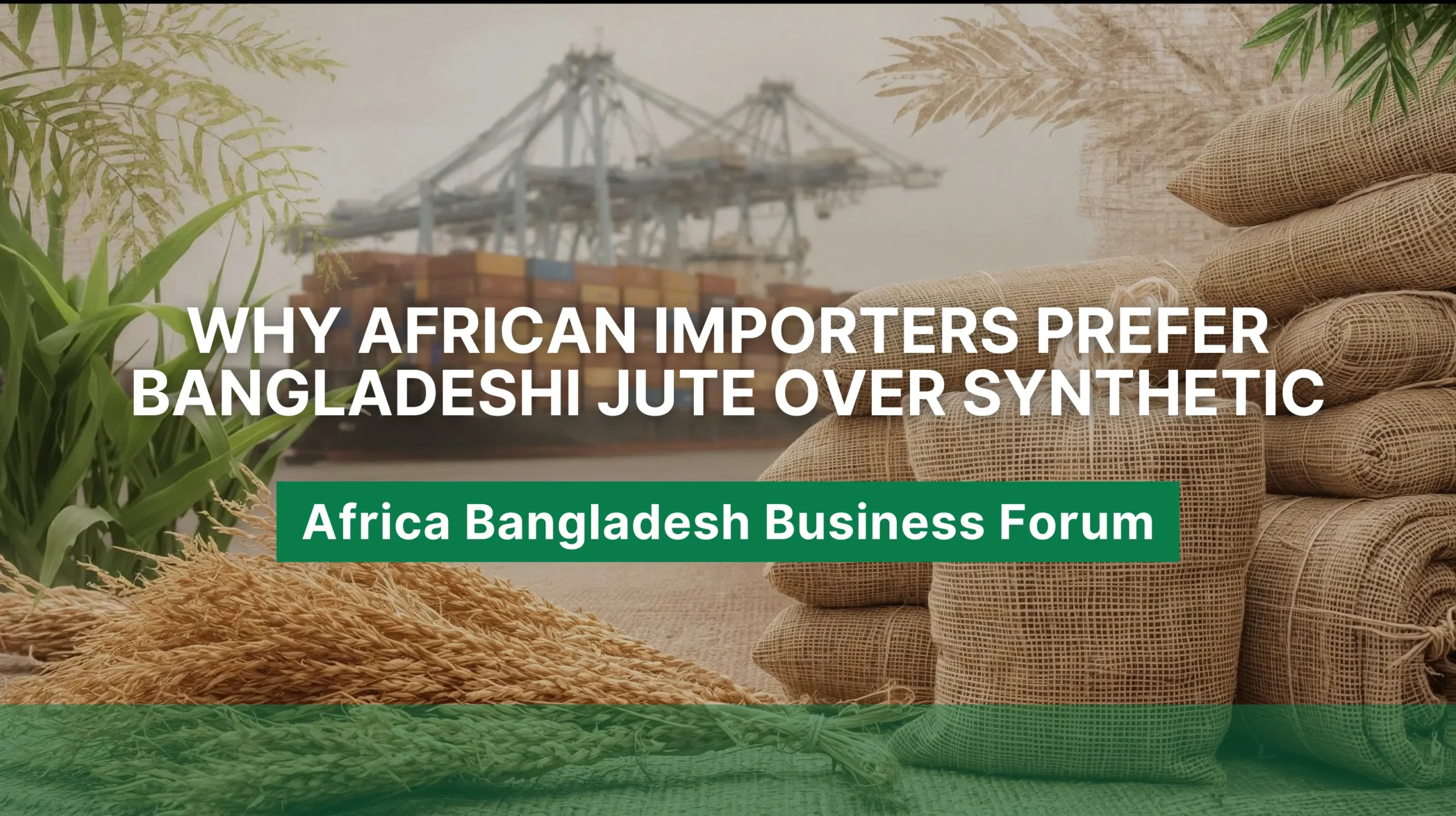
Why African Importers Prefer Bangladeshi Jute Over Synthetic
African businesses are increasingly embracing sustainability by choosing eco-friendly products. This shift is evident in the growing preference for Bangladeshi jute over synthetic materials like polypropylene. Jute, known as the “Golden Fiber,” offers numerous advantages that align with both environmental goals and business interests.
The Environmental Imperative: Jute’s Eco-Advantage
1. 100% Biodegradable and Compostable
Unlike synthetic materials that can persist in the environment for centuries, jute is a natural plant fiber that decomposes naturally, reducing long-term environmental impact.
2. Reduced Carbon Footprint
Jute plants absorb significant amounts of CO₂ during their growth, making them a carbon-neutral raw material.
3. Fighting Plastic Pollution
With increasing plastic bans and environmental awareness in Africa, jute products offer a sustainable alternative that consumers are eager to embrace.
Superior Quality and Performance of Bangladeshi Jute
1. Unmatched Strength and Durability
Bangladeshi jute is renowned for its high tensile strength, making it ideal for creating robust sacks, bags, and textiles that can be reused multiple times.
2. Breathability
Jute fiber’s natural properties allow air to circulate, which is crucial for transporting agricultural commodities like grains and coffee without spoilage—a key advantage over non-breathable synthetic sacks.
3. Aesthetic and Versatile
Jute has a natural, rustic appeal that is popular in fashion, home décor, and high-end packaging, offering a premium look that synthetics cannot replicate.
The Economic Case: Long-Term Value Over Short-Term Cost 💰
1. Competitive Pricing from the Source
As a top global producer, Bangladesh offers highly competitive pricing on a wide range of jute products.
2. Durability Equals Lower Replacement Costs
While the initial cost of a synthetic bag might be slightly lower, the superior reusability of jute bags provides better long-term value for money.
3. Growing Consumer Demand
Stocking sustainable jute products attracts a loyal customer base willing to pay a premium for eco-friendly goods, boosting retailer profits.
How to Connect with Bangladesh’s Top Jute Exporters
The Challenge
Navigating a foreign market to find verified, trustworthy manufacturers can be a significant hurdle for importers.
The Solution: A Direct Trade Bridge
The Africa Bangladesh Business Forum (ABBF) is an organization dedicated to making trade between Africa and Bangladesh simple, secure, and transparent.
Use the Kingmansa Marketplace
ABBF’s official B2B marketplace, Kingmansa, is the premier platform for African importers. It allows you to browse catalogs from pre-vetted Bangladeshi jute suppliers, compare prices on everything from “jute sacks” to “eco-friendly tote bags,” and communicate directly with manufacturers.
Your Strategic Partner for Sourcing Jute: The Africa Bangladesh Business Forum
ABBF goes beyond just a supplier list:
- Verified Suppliers: Gain access to a curated network of Bangladesh’s top jute product manufacturers.
- B2B Matchmaking: Get personalized assistance in finding the perfect supplier for your specific retail needs.
- Market Insights: Understand trade policies and logistics to make importing seamless.
Call to Action
Join the Africa Bangladesh Business Forum (ABBF) today to start your export journey to Africa. With access to trade fairs, business forums, and a network of reliable partners, you will be well-equipped to grow your business and succeed in the African market.
Book a CallReady to Make the Switch?
Visit the Kingmansa marketplace to connect with leading Bangladeshi jute exporters today. Join the Africa Bangladesh Business Forum to unlock exclusive trade opportunities and build lasting partnerships.
FAQs
1. Why is jute considered an eco-friendly alternative to synthetic materials?
Jute is 100% biodegradable, compostable, and has a low carbon footprint, making it a sustainable choice over synthetic materials like polypropylene.
2. What are the advantages of Bangladeshi jute over other sources?
Bangladesh offers high-quality jute with superior strength, durability, and competitive pricing, supported by a well-established industry.
3. How can African importers source jute products from Bangladesh?
African importers can connect with verified Bangladeshi jute suppliers through platforms like Kingmansa, facilitated by the Africa Bangladesh Business Forum (ABBF).
4. Are there any trade restrictions on importing jute products from Bangladesh?
Currently, there are no significant trade restrictions. However, importers should stay informed about any regulatory changes that may affect trade.
5. What types of jute products are available for import?
A wide range of jute products are available, including bags, home décor items, agricultural sacks, and fashion accessories

